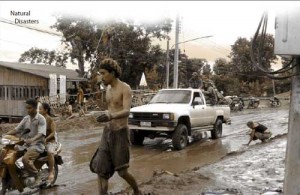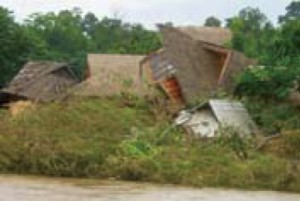Just past dawn on Saturday, August 13th, Suzan Crane was awakened to find her stilted wood bungalow swimming in the river and a house floating downstream. Over the following few days, she pitched in with the relief effort and spoke with other survivors and volunteers about the worst floods to drown Pai in 40 years. (Originally published in Untamed Travel)
 JOHN KELLY, English expat resident of Pai, whose house was destroyed:
JOHN KELLY, English expat resident of Pai, whose house was destroyed:
“I woke up at around 7am with my roommate Dan knocking on my door. When I put my foot out of bed it was met with about one inch of water. I then opened my bedroom door and within a second I was nearly chest high in water and mountain debris, tree branches, etc. There were seven people in the house, including a one-and-a-half-year-old baby. In the background you could hear people screaming outside. When I opened the door the first thing I saw was Aor holding her baby, chest high in water, crying, and in shock. I took the baby from her and battled my way through the water to the other side of the room, forced a window open, because by this time water was coming in through the window, then sat on the window ledge and put the baby over my head to safety on the rooftop. That’s when I became aware of all the stuff happening throughout the village because of the view from the roof. I was joined by Dan on the roof only to witness a complete huge wooden house drift past where our back garden used to be.
“Eventually, local Thai residents called us to higher ground. We went to the end of the road, waded through the shit to get there, and went to the municipal office where the water level was much lower and safe. Without any regard for our possessions, we left everything behind. There were many people wandering around the municipal office in shock. Then we walked through town to see how we might help and share the grief and the shock. I lost everything except my guitar, wallet and passport, which my roommates were able to save. We were able to salvage a few things at a later time, which were generally ruined. We’re all homeless now, so we’re staying at friends’ houses. Generally speaking, most people got together and did shit. The community pulled together. Five days later, it still feels bizarre, but positive.”
ELIN LUNDSTROM, expat Pai resident from Sweden, who has been tirelessly involved in relief efforts:
“My house is okay, but the bar where I was working will never reopen. The question now is what Pai is going to look like in the future. Who will want to build by the river, because most of the riverside guesthouses are destroyed? But it’s nice to see everyone coming together to help each other out. We have a 25-person work crew that includes expats, locals, and tourists. We’ve been going all over town doing massive digging and cleaning, but we have also been to some smaller villages to help. I’m amazed that it’s coming together so quickly because now we have the army as well. There has also been community support by one of the temples, which is being used as a shelter and where people can make donations.
“I think we’re all very grateful for the help we’ve been getting. Restaurants are providing free food for volunteers and volunteers are providing invaluable assistance. Many people feel that the number of casualties is a lot less than expected, although more than reported, so people are calm and grateful to be just alive, even though they lost businesses and homes. Unfortunately, there has also been looting in the houses and abandoned bungalows.
“One thing that is affecting us the lack of information and the national newspapers seem to be reporting conflicting information. Papers are saying six dead, eight missing in the whole area which includes Mae Hong Song, Chiang Rai, Chiang Mai, Soppong, and everything in between. I find it hard to believe that the casualties are so low.”
 SIRIRUCH KITTIKUNADUL, former Bangkok native, San Francisco resident and owner of Witching Well Café:
SIRIRUCH KITTIKUNADUL, former Bangkok native, San Francisco resident and owner of Witching Well Café:
“When we went to open shop at 8am, the damage was already done, so we cannot do anything until the water went down. The shop was filled with mud. Furniture was floating on mud. I was very upset because we just opened two months ago. But now we realise it is not so bad. The hardest thing is to clean up. Things were not lost, but buried in mud and all had to be cleaned. A lot of our customers came to help, which made me feel much better. People have much heart. The most expensive thing we lost is digital camera. We are very lucky that we didn’t get hit as hard as others since we had metal door that came down. Since Pai is not big city like Chiang Mai and it is mostly wood and bamboo, I think it won’t take so long to rebuild. It’s not like tsunami where everything got washed out. On the street where our shop is some shops even reopened. One week later, the city is starting to get back to business, but until the mud is all cleaned up, we cannot really do much.
“I don’t feel sorry for what happened with our shop. Instead I feel my spirits were lifted because the customers who had food and coffee at our cafe just the day before come back day of flood to help clean up. I believe we still have angels looking after us. I feel even better than before.”
MATT WELLS, traveler, river guide/paramedic from Utah, USA, who aided in river rescues:
“I had only been in Pai for a day and a half. I was at a guesthouse up the road from the river and there was two feet of water outside my door. I had it easy because all I had to do was throw my pack over my shoulder and walk away from my bungalow. When I got to the town center I started hearing stories of the chaos and decided I wanted to help somehow. I saw a local river guide carrying a raft with four young army kids, all of whom looked like they had no river experience. I ran up to the guide Tap and told him that I am a river guide and paramedic. Can I help? He said, ‘Yes,’ so we go down to where the river was and push off right from town. I was scared, honestly, because I was thinking that it wasn’t the safest thing to do, but I just went for it.
“As we pushed out onto the river, I got an idea of the power and destruction of the river. It had grown in size 20 times. We made our way onto the middle and saw that half the bridge was getting hit by water and the other half, luckily enough, wasn’t so high yet that we couldn’t go under. Then we heard people yelling in the trees in the middle of the river. Going against all river safety, Tap pointed us in the direction and as we slammed into the trees I saw two families up there. One person handed me a four-year-old girl – it was one of the most surreal things in my life. There were five more adults, including an old woman who was crying, and a man with an infant on his back… we loaded them onto the raft and then made it to shore somehow and dropped them off. We carried the raft up the rice fields, maybe a mile, put back in again, crossed the river, we had to carry the raft through all these logs and debris hitting us, pushed off again, saw another man stranded in the trees, got him and saw yet another man stranded in trees and retrieved him. Unfortunately, we passed a stranded dog that was trapped and we left him behind, which was sad. We had literally rafted through bungalows on the side of the river to make it to shore, where we dropped the two men off. They started yelling “whiskey” and they gave us moonshine and were very thankful.
“When I heard for the first time that two people had drowned, everyone seemed very calm and I was surprised by that. They [Thais] seem to deal with death better. Tap lost a house, 30 pigs, a motorbike. But he was still happy to be alive and help others. He saved probably 30 people that day.”




 Global Gypsy Collection ©2010 - 2011
Global Gypsy Collection ©2010 - 2011